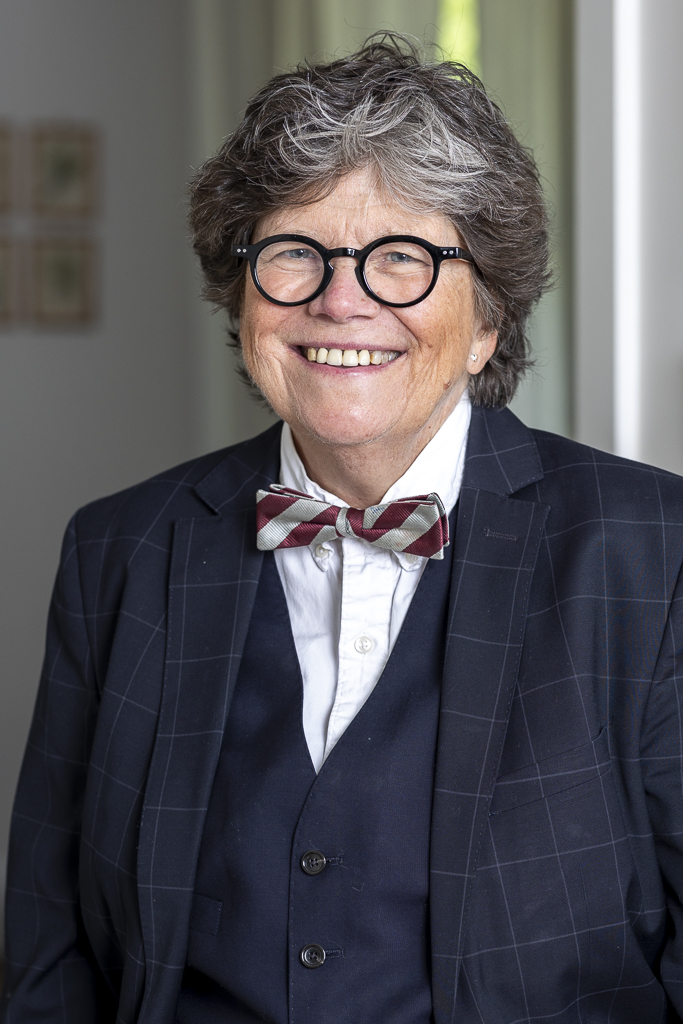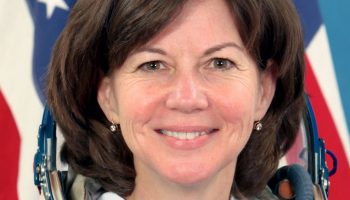Calling all leaders and staff of nonprofit organizations large and small, board members and other volunteers, those considering not-for-profit work, and those taking a break from it: Joan Garry — nonprofit leadership expert, executive coach and strategic adviser — will be at Chautauqua this weekend and she has much to impart, because what you do (and don’t do) matters, as does how and why you do it.
Through humor, storytelling and her contagious conviction about the power of the nonprofit sector, Garry will kick off the Chautauqua Women’s Club’s 2022 Contemporary Issues Forum with her talk, “ADVOCATE: Noun, Verb, You!”
The forum is at 2 p.m. on Saturday, July 2, in the Hall of Philosophy, a venue that is especially apropos for Garry.

She attended Fordham College at Rose Hill in the Bronx, the oldest of Fordham University colleges. She graduated in 1979 with a double major in communications and philosophy.
“My particular focus was on ethics, defined as ‘advocacy for the good,’ ” Garry said.
In her book, Joan Garry’s Guide to Nonprofit Leadership: Because the World is Counting on You, she wrote, “Father Jim Loughran, SJ, of blessed memory, taught my first philosophy class. He challenged me to consider the value of my moral compass, my own intellectual capacity, and the power of inquiry.”
Garry’s connection to Fordham has endured. In 2021, she served as a keynote speaker at Fordham’s fifth annual Women’s Summit. And this March, she and her spouse, Eileen Opatut, matched all gifts up to $50,000, to Fordham’s LGBTQ Student Wellbeing Fund.
Garry has also flourished outside of Fordham University.
“In my first job out of college, I landed on the management team of MTV,” Garry wrote in her book. “Yes, working at MTV in the early ’80s was just as cool as you can imagine. … I learned about the pace, intensity and thrill of being a part of a startup.”
She also learned about innovation, budgets and balance sheets.
In 1989, eight years after beginning work at MTV, Garry moved on to Showtime Networks.
“There I became a very good manager of people,” she wrote. “I became a team player. I learned what it meant to be a good corporate citizen as one of the early gay poster children when Showtime began to walk the talk on diversity.”
During her second experience as a member of a cable TV management team — launching Showtime’s pay-per-view channel — Garry realized that she had a voice.
“I became another poster child — essentially an employee advocate for better communication and transparency from the senior leadership,” she wrote. “… I found my voice as an advocate for the employees at Showtime. I found my wheelhouse.”
During this, she said she met the woman who would become her wife, and who she would raise children with.
“We decided to have kids,” she said. “I believe your advocacy DNA explodes the minute you have a baby for the first time. You want to advocate for your kids, particularly given their unique family constellation. Eileen did all the birthing, and I did all the catching, so I was a legal stranger.”
They filed a lawsuit in 1993, In the Matter of the Adoption of a Child by J.M.G., so that Garry could gain legal rights to her daughter.
“This was a huge road for me,” she said. “The court basically ruled that I had the standing of a stepparent. Other states had that, but not New Jersey. That led me to think that there should be more I should do for my family.”
Garry began advocacy work that would benefit all LGBTQ community members. She was named CEO in 1997 of the non-governmental media monitoring organization Gay and Lesbian Alliance Against Defamation (GLAAD), one of America’s largest gay rights organizations. Garry transformed its financial health from barely surviving to thriving. It soon became significant for changing hearts and minds about LGBTQ issues.
“Probably our biggest accomplishment was persuading The New York Times to include photos of gay and lesbian couples on their wedding pages,” Garry said.
After eight years at GLAAD’s helm, Garry left in 2008 to co-chair the Obama Administration’s LGBT finance committee, starting her service in a leadership position on the board of a national organization.
Because she had experienced work with several nonprofit boards, she started a blog to continue advocating in an online space.
“Before I could blink, I had 100,000 viewers,” Garry said. “That led to a podcast and a book about how I can advocate for the success of nonprofits. I realized that most are tiny organizations. Seventy percent have budgets of less than half a million dollars. Who is their advocate?”
In 2017, it led to the launch of a membership website, Nonprofit Leadership Lab, for staff and board leaders of small nonprofits.
“I have supported close to 5,000 leaders in North America and the world,” Garry said. “Besides being a parent, nonprofit leadership has been the most rewarding work of my life. I help people in Australia run an organization more effectively. I kick up someone’s gala speech to earn more for their nonprofit.”
Of course, being a champion for nonprofits has its challenges.
“Nonprofits are messy,” Garry said. “It’s not a pejorative thing. The power is all around the organization. … It’s a very different model.”
Think about it: How could it be easy to lead a cash-strapped not-for-profit that is juggling a plethora of passionate people who are involved in a myriad of ways?
“The most challenging thing for me is that there are higher and lower levels,” Garry said. “One is that far too many people join boards and don’t really understand how important the job is. If they did, and they invested in doing the job well, nonprofits would be the better for it.”
Another challenge, she said, is that “it’s almost as if the nonprofit sector needs a publicist.”
To Garry, nonprofit organizations are the “backbone of our society” because they “turn towns into communities.”
She wants people to consider themselves as advocates in a world that badly needs them rather than as volunteers who say, “I just help out on Wednesdays.”
“People think that society has a dearth of leadership,” Garry said. “The hell it does. Go through a town and you’ll see the Y, the museum, the shelter. … These are people who give us hope. I want to elevate that because there should be no such thing as a ‘hidden gem.’ ”
The problems that Garry is drawn to now are those that are “particularly messy.”
She said that the nonprofit sector exploded in the 1970s with the anti-war and other movements, and lots of Baby Boomers are now retiring. Many are founders, or they behave as though they were founders, because of their long tenure, so setting up new directors for success is important to her.
“There are dust bunnies on top of dust bunnies,” Garry said.
She spoke on the influence of race in these leadership roles.
“There’s more racial reckoning, as more people of color are leading nonprofits. If you’re following someone who’s been in the job for 25 years, probably a white man, and then you come in as a person of color, they may not be able to set you up to succeed. I coach a fair number of executive directors of color who are doing that.”
Garry said that she will challenge Chautauquans who come to the Hall of Philosophy on Saturday afternoon “to see themselves as advocates who not only have a point of view, but who also do something about it, who get out of the stands and onto the field.”
And because she believes that people need to see themselves as advocates, Garry wants them to look in the mirror and say, “That’s an advocate there!”




